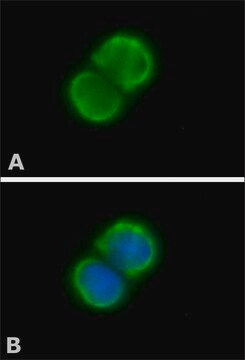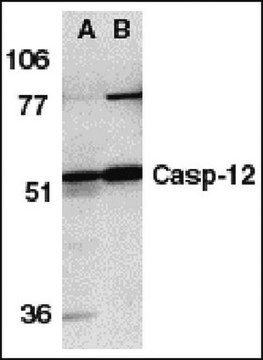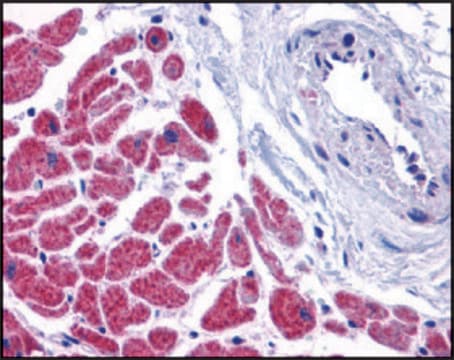AB3612
Anti-Caspase 12 Antibody, prodomain, aa 100-116
Chemicon®, from rabbit
About This Item
Recommended Products
biological source
rabbit
Quality Level
antibody form
affinity purified immunoglobulin
antibody product type
primary antibodies
clone
polyclonal
purified by
affinity chromatography
species reactivity
human, rat, mouse
manufacturer/tradename
Chemicon®
technique(s)
immunohistochemistry: suitable
western blot: suitable
isotype
IgG
UniProt accession no.
shipped in
wet ice
target post-translational modification
unmodified
Gene Information
human ... CASP12(100506742)
mouse ... Casp12(12364)
rat ... Casp12(156117)
General description
Specificity
Immunogen
Application
Apoptosis & Cancer
Metabolism
Caspases
Enzymes & Biochemistry
Immunohistochemistry: 2 μg /mL in mouse liver tissue
Mouse brain tissue lysate can be used as a positive control. Caspase 12 is associated with ER membranes and not in cytoplasm or mitochondria. Caspase 12 mediates cytotoxixity induced by amyloid beta.
Optimal working dilutions must be determined by end user.
Physical form
Storage and Stability
Analysis Note
Positive: mouse brain tissue lysate
Other Notes
Legal Information
Disclaimer
Not finding the right product?
Try our Product Selector Tool.
Storage Class Code
10 - Combustible liquids
WGK
WGK 2
Flash Point(F)
Not applicable
Flash Point(C)
Not applicable
Certificates of Analysis (COA)
Search for Certificates of Analysis (COA) by entering the products Lot/Batch Number. Lot and Batch Numbers can be found on a product’s label following the words ‘Lot’ or ‘Batch’.
Already Own This Product?
Find documentation for the products that you have recently purchased in the Document Library.
Our team of scientists has experience in all areas of research including Life Science, Material Science, Chemical Synthesis, Chromatography, Analytical and many others.
Contact Technical Service







